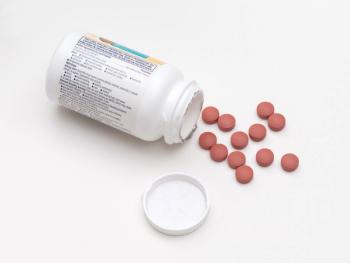
Education Is Crucial to Close Gaps in Colorectal Cancer Risk Awareness
The #MyCRChistory campaign encourages the public to share their family history of colorectal cancer.
Colorectal cancer is one of the leading causes of death in the US, and thousands of Americans may be at high risk for the disease without realizing it.
According to research from Reese Pharmaceutical, 80% of US adults do not know whether a first-degree relative—a parent, sibling, or child—has been diagnosed with
For men and women younger than 50 years of age, colorectal cancer is the leading and second leading cause of death in each sex, respectively. Among younger individuals, there has been a “troubling spike” in new diagnoses of colorectal cancer, with cases nearly double what they were a decade ago.2
READ MORE:
“The data proves that there is a significant gap in awareness that could be contributing to an increase in colorectal cancer rates,” said Jeff Reese, president of Reese Pharmaceutical.1 “Knowing your family history is crucial because the information can be used to determine how early and often you need to get screened, which can aid in prevention and treatment.
Through a new educational campaign, Reese Pharmaceutical is encouraging individuals to use the hashtag #MyCRChistory share their story on social media. The campaign also includes information on available colorectal cancer screening tools, including ColoTest, a fecal immunochemical test manufactured by Reese Pharmaceuticals. ColoTest is available OTC and provides results within minutes. ColoTest was cleared by the FDA in September 2023.2,3 Research has shown that immunochemical test screening can reduce the overall risk of colon cancer death by 33%.4
Data from the Reese Pharmaceutical survey showed that most consumers “remain unaware of OTC tests…and only 3% have ever used them.” A majority of survey respondents also indicated that they would reach out to their health care provider if an at-home fecal immunochemical test returned positive results, “suggesting a Need to educate [health care providers] and pharmacists about the various at-home options as well.”
A total of 1250 adults in the US aged 35 to 75 years completed the survey.
In March 2024, Jeff Reese sat down with Drug Topics to discuss ColoTest.2 Read on for an excerpt from the interview or
Drug Topics: Can you talk about the features of ColoTest that differentiate it from existing at-home diagnostic options for colon cancer screening?
Reese: Several colorectal cancer screening options are available today for patients to consider. One of the original at-home tests leverages FOBT technology. While effective, these tests can be challenging because they involve collecting multiple stool samples over several days. Diet restrictions must also be considered to ensure the test is effective. In addition, some tests require samples to be mailed to a lab for analysis.
Cologuard is another option for colorectal cancer screening. It’s a stool DNA test for people 45 and older. While there is no prep involved, the test does require a prescription, as well as lab analysis, and typically goes through insurance. Cologuard is also only recommended for use every three years.
ColoTest is one of the newest at-home screening options available, using FIT technology. With ColoTest, users not only collect the sample at home but also receive their results at home in as little as one minute. It is available over the counter at an affordable cost for anyone to purchase out of pocket; there are no age or dietary restrictions and it’s recommended for use once a year. In short, it’s a modern option that offers consumers a simpler, more private, and accessible alternative to traditional methods. We believe the convenience and privacy ColoTest delivers will encourage more people, including younger people, to undergo colorectal cancer screening, potentially leading to earlier detection and improved outcomes.
How do these features contribute to its effectiveness in early detection?
Reese: The best screening test for colorectal cancer is the one that patients are willing to use.
While colonoscopies remain the gold standard for screening, unfortunately, many people forego them due to a combination of insurance limitations and fear. Without adequate insurance coverage, the cost of a colonoscopy can be a significant barrier. Fear and anxiety surrounding the procedure can also deter individuals. For some, access is an issue. They may live far from a facility or lack transportation to and from the procedure (physicians recommend patients have a ride home if they go under anesthesia).
ColoTest offers a solution to these obstacles. The test is affordable, so people can pay out of pocket for it. It’s available without a prescription and 100% non-invasive, so people can test privately in the comfort of their own homes. What’s more, the test can be purchased online through Amazon or at their local pharmacy, eliminating the need for transportation.
Put simply, ColoTest helps facilitate effective early detection of colorectal cancer by making screening more accessible, affordable, and convenient.
Could you provide insights into the clinical evidence supporting ColoTest’s accuracy and reliability in detecting hidden blood in stool?
Reese: ColoTest is a fecal immunochemical test—or FIT test—that is a well-established screening method. It is recognized for its effectiveness in detecting abnormal blood in stool that may indicate the presence of colorectal cancer. ColoTest received FDA clearance through the 510(k) process. Conducted as an annual screening, ColoTest is 98.8% accurate in detecting invisible blood in stool.
READ MORE:
References
Nationwide survey shows an alarming gap in awareness of colon cancer risk. News release. Reese Pharmaceutical. August 20, 2024. Accessed September 10, 2024.
https://www.prnewswire.com/news-releases/nationwide-survey-shows-alarming-gap-in-awareness-of-colon-cancer-risk-302224815.html?tc=eml_cleartime Meara K. New OTC colon cancer test makes screening more accessible, affordable. Drug Topics. March 25, 2024. Accessed September 10, 2024.
https://www.drugtopics.com/view/new-otc-colon-cancer-test-makes-screening-more-accessible-affordable Reese Pharmaceutical launches new at-home colon cancer screening test. News release. Reese Pharmaceutical. February 27, 2024. Accessed September 10, 2024.
https://www.prnewswire.com/news-releases/reese-pharmaceutical-launches-new-at-home-colon-cancer-screening-test-302070648.html Doubeni CA, Corley DA, Jensen CD, et al. Fecal immunochemical test screening and risk of colorectal cancer death. JAMA Netw Open. 2024;7(7):e2423671. doi:10.1001/jamanetworkopen.2024.23671
Newsletter
Pharmacy practice is always changing. Stay ahead of the curve with the Drug Topics newsletter and get the latest drug information, industry trends, and patient care tips.























